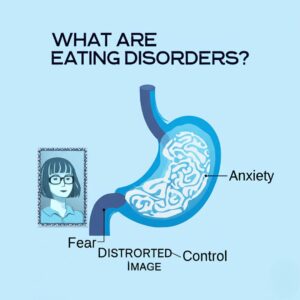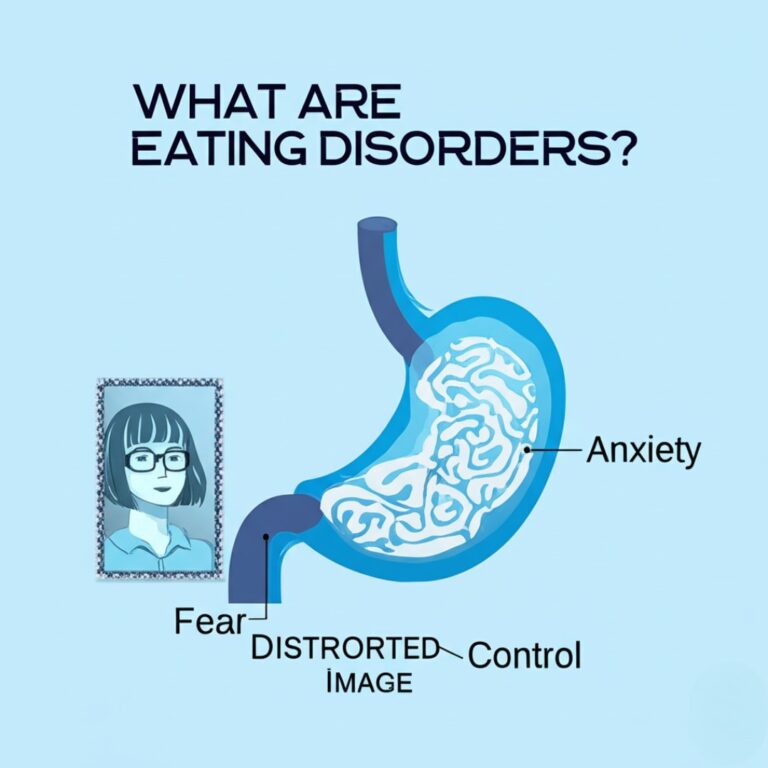Awareness of mental illness has to do with highlighting the millions of challenges an individual can face across the globe. If the stigma that surrounds therapy were truly broken, a lot more people would seek sane healing. Awareness is a significant difference in the life of that one person: knowing and understanding key warning signs, and bringing in a filtering, validating, supportive environment will actually change lives.
The Importance of Mental Illness Awareness
Mental health deserves equal treatment as that of physical health. However, many believe that openly discussing mental illness awareness is a huge challenge. campaigns for awareness, such as Mental Illness Awareness Week, help disseminate information to the public concerning mental disorders, their early recognition, and the treatment alternatives.
Common Mental Illnesses and Their Impact
Understanding various mental disorders educates the general public, besides enabling them to spot symptoms earlier on for most mental disorders.
1. Anxiety Disorders
The disorders of anxiety are among those most frequently met with in the field of mental disease. Such figures usually run into millions at the global level, for example:
- Generalized anxiety disorder (GAD)
- Panic disorder
- Social anxiety disorder
- Obsessive-compulsive disorder (OCD)
- Posttraumatic stress disorder (PTSD)
2. Depression
Depression is altered mood; manifests with functional impairment in the everyday lives of individuals. The symptoms are then lasting sadness, wanting to do something, and fatigue. The campaigns which spread awareness on mental illness focus on early identification and treatment so that there can be no severe events.
3. Bipolar Disorder
It includes extreme emotional ‘ups and downs’ or very high-a great deal of depressive low and a great deal of max-high mania. Mood disorders can be stabilized by proper diagnosis and good pharmacological management.
4. Schizophrenia
Schizophrenia is an incapacitating disorder; it is marked by hallucinations- delusions- disorganized behavior- and disordered thinking and perception. Awareness of mental illnesses will help reduce stigma and yield possible relief to the sufferer.
5. Eating Disorders
Medical intervention is required for anorexia nervosa, bulimia nervosa, and binge disorders since they are severe conditions. Such publicity of these disorders aims to raise awareness for early diagnosis and treatment.
The Role of Mental Illness Awareness in Society
Awareness of mental illnesses is very much a factor in making a society more empathetic and supportive. It brings down stigma, hence minimizing hurdles for an individual to seek help. Awareness campaigns change how communities perceive mental health problems through education and honest dialogue. This awareness will lead to policy changes as well as increased availability and access to mental health resources for those adolescents needing timely intervention and support.
Reducing Stigma: New trend of democratizing education on mental health is already quite effective in dispelling common misconceptions and resulting in low rates of disability discrimination among those who suffer from mental illness. Awareness programs and open conversations promote the development of a more open and supportive society. When individuals know more about mental health conditions, they will be more likely not only to have empathy but also to give assistance rather than judgment in dealing with it.
Encouraging Early Diagnosis: It is that early recognition of the symptoms of mental health ill-health enables affected persons to obtain timely medical and psychological intervention.Sometimes, severe conditions are diagnosed early enough so that even in advanced states of the disease, it can be controlled and sometimes even improved treatment responses. It can also help patients greatly to better manage and endure their problems in mental health with early intervention and get better long-term outcomes.
Promoting Supportive Environments: What makes the environments secure and supportive in schools, regular workplaces, and communities for people who confront mental health issues is an affair all around availing the needed resources. The policies that go through -dutch counseling services and stress management programs among others-make a huge difference in mentally well-off individuals. A supportive environment creates the atmosphere necessary for discussions; hence, less feeling of isolation for individuals.
How to Promote Mental Illness Awareness
The Catalyst of Improved Awareness towards Mental Illness. Many individuals, as well as organizations, can help, and there are misguided ways on how mental illness can be promoted. First, they can educate themselves and others about mental disorders to dispel false beliefs. Open discussion spurs communication on mental well-being, and thereby stigma would be reduced, and persons facing problems will come forward seeking help without fear. When organizations contribute to mental health initiatives in a resource-giasing awareness campaign and develop mental well-being programs, this all comes together for a well-informed society to behave in a compassionate way and support people who have their lives turned upside down by mental illness.
1. Education and Advocacy
Grass-roots campaigns and public education campaigns, social media discussions, workshops, and deliberate studies keep us ahead w.r.t the understanding of MH conditions and the impacts they put on people.
2. Encouraging Open Conversations
Inflating the significance of dialogue about mental health will go a mile to encourage those afflicted with mental ailments to seek help without fearing ridicule.
3. Supporting Mental Health Services
Establishment of psychiatric hospitals and spots for affordable treatments with emphasis on professional courses should be encouraged among public and private institutions.
4. Participating in Mental Illness Awareness Week
Affecting all, their steep noise venturing outside leaves them capable of scaring the listener. The Mental Illness Awareness Week is one such event, where awareness could be brought to the personal trauma, with additional resources and advice from clinical experts.
Seeking Help and Treatment Options
Mental illnesses can be treated through some modes of therapy, which can help people get through or cope with their low points. There are intervention activities involving trained and qualified professionals, either through personal or online consultations over someone who can guide them on how to understand their symptoms and teach coping techniques.
A prescription involving medication, which is a course that health professionals may administer to improve the well-being of individuals experiencing mental illness, helps ease the symptoms and curb complications associated with mental purifications.
They can be facilitated through sessions involving their peers or other available community supports that provide them with a safe and confidential physical setting for sharing experiences and expressing feelings. Seeking help is a very courageous and brave act, and when that support arrives, recovery and a better one’s life are indeed possible.
Therapy: Most probably, CBT, psychotherapy, and counseling are leading ways of treating mental health problems. Therapy allows people the time to explore negative and sometimes irrational thought processes, allowing room for change through learning or discovering coping techniques in achieving emotional comfort. Then these people would be able to navigate their personal problems with structured support for professional assistance.
Therapy allowed to freely express feelings, confidentially and work toward personal growth efforts. Therapies improve the mental state of an individual and provide permanent solutions for an improved quality of life.
Medication: Prescribers of mental health are antidepressants, antipsychotic medications, and mood stabilizer drugs to control the symptoms. These types of medicines function by balancing the brain’s chemicals that affect mood, emotions, and behavior. Undergoing fine medical supervision, the right dosage and type of drug for that person will be taken. This is because medication is not a cure, but it will help greatly when combined with therapy to achieve the maximum stability and sense of well-being. Following the doctor will ensure the best success outcome.
Support Groups: They give a haven to those willing to share experiences and problems without judgment-a community-based individuals group. Along with providing emotional support and encouragement, such groups offer a feeling of belongingness. Bonding with other people who have similar difficulties helps reduce the effects of isolation and enhances skills in coping.
Such settings, where professionals and/or peers provide support, motivate individuals, engender direction, foster resilience, and improve mental health through the values of mutual support.
Self-care Practices: Sometimes, self-care practices like exercising, meditation, or a healthy lifestyle can safeguard a person’s mental health. Such practices are invigorating and induce the endorphins that improve mood and tensions.
Conclusion
Campaigning awareness for mental illness is a major step in fighting the stigma developed around mental health-based disorders. We sensitize ourselves and those concerned about them to build a society appraising mental well-being. This Mental Illness Awareness Week commit to understanding, encouraging treatment, and treasure-ing mental health in a world. Keep yourself updated, and join the diverse discussions surrounding mental health issues at the Discuss Forum where latest updates and insight are provided about raising awareness and support.
FAQs
How to promote mental health?
These five components that promote mental health are encouraging open conversations, reducing stigma, offering resources, supporting work-life balance, and advocating for self-care practices such as exercise and mindfulness.
How to improve mental health naturally?
Conscious mental wellness enhancement through exercise, nutrition, sleep, awareness of welfare, meditation, socialization through relationships, and techniques that benefit coping with stress are surely far-reaching in mental well-being enhancement.
How to help people with mental health issues?
This will contribute to helping someone with mental health challenges by being present during their difficult times, offering support without judgment, encouraging professional help, providing emotional and practical assistance as much as possible, educating oneself about mental health, and looking to gain a safer and more tolerant environment.










